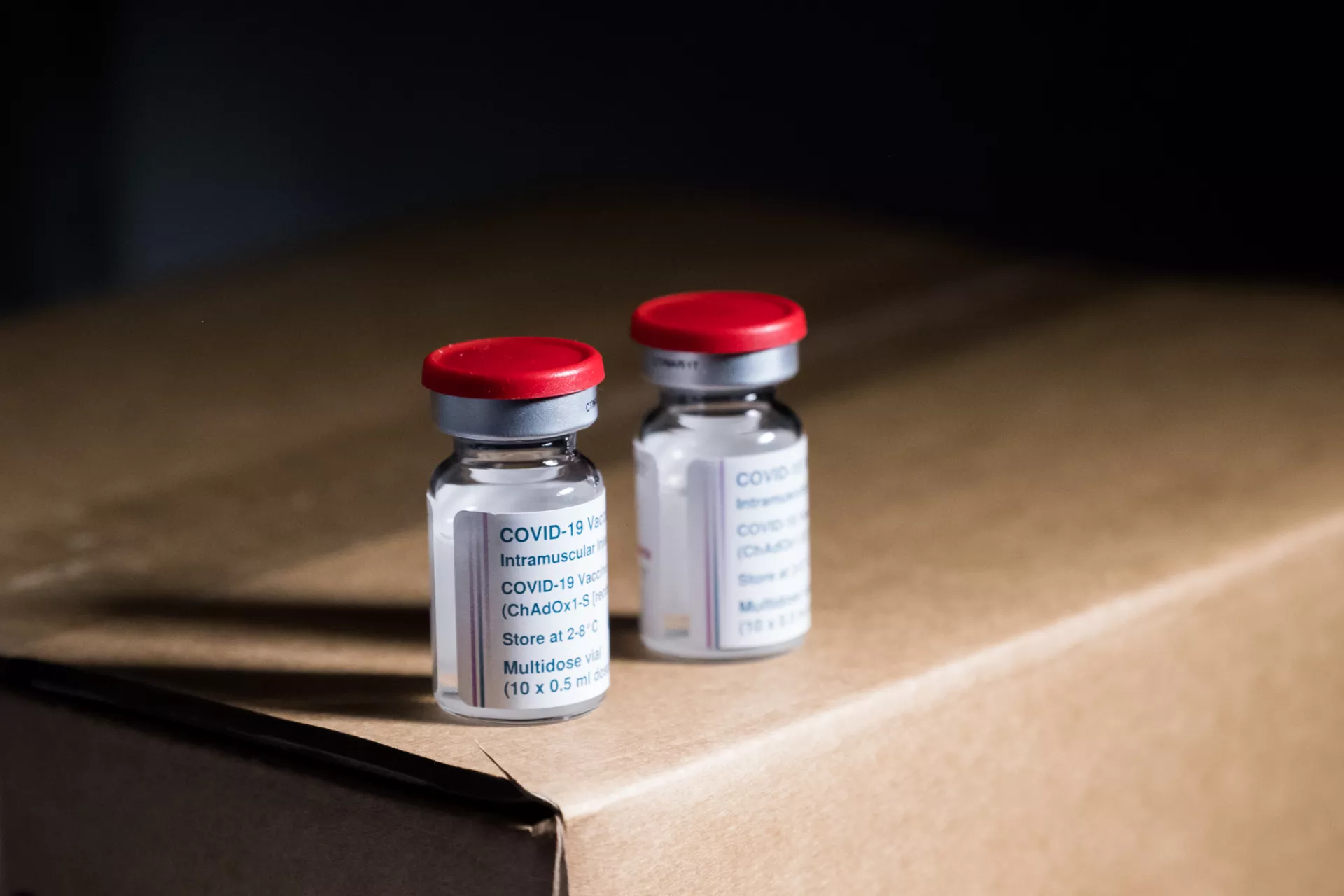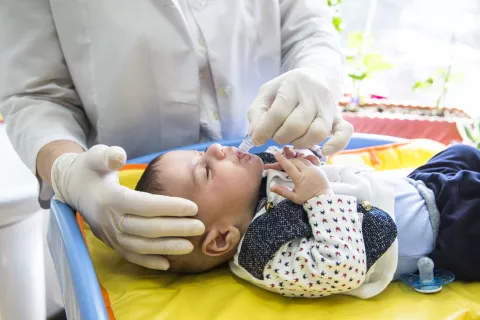What you need to know about COVID-19 vaccines
Answers to the most common questions about coronavirus vaccines.

- Available in:
- English
- ქართული
Vaccines save millions of lives each year. The development of safe and effective COVID-19 vaccines is a huge step forward in our global effort to end the pandemic and to get back to doing more of the things we enjoy with the people we love.
We’ve gathered the latest expert information to answer some of the most common questions about COVID-19 vaccines. We will continue to update this article as more information becomes available.
Jump to the latest information on:
How COVID-19 vaccines work
Vaccine safety
Vaccine effectiveness against new COVID-19 variants
When not to get a vaccine
Why you should get a vaccine even if you’ve had COVID-19
COVID-19 vaccines and breastfeeding
COVID-19 vaccines and pregnancy
COVID-19 vaccines and children
How to report vaccine misinformation
How do COVID-19 vaccines work?
Vaccines work by mimicking an infectious agent – viruses, bacteria or other microorganisms that can cause a disease. This ‘teaches’ our immune system to rapidly and effectively respond against it.
Traditionally, vaccines have done this by introducing a weakened form of an infectious agent that allows our immune system to build a memory of it. This way, our immune system can quickly recognize and fight it before it makes us ill. That’s how some of the COVID-19 vaccines have been designed.
Other COVID-19 vaccines have been developed using new approaches, which are called messenger RNA, or mRNA, vaccines. Instead of introducing antigens (a substance that causes your immune system to produce antibodies), mRNA vaccines give our body the genetic code it needs to allow our immune system to produce the antigen itself. mRNA vaccine technology has been studied for several decades. They contain no live virus and do not interfere with human DNA.
For more information on how vaccines work, please visit WHO.
Are COVID-19 vaccines safe?
Yes, even though COVID-19 vaccines are being developed as rapidly as possible, they must go through rigorous testing in clinical trials to prove that they meet internationally agreed benchmarks for safety and effectiveness. Only if they meet these standards can a vaccine receive validation from WHO and national regulatory agencies.
UNICEF will only procure and supply COVID-19 vaccines that meet WHO’s established safety and efficacy criteria and that have received the required regulatory approval.
>>Read What you need to know before, during and after receiving a COVID-19 vaccine
How were COVID-19 vaccines developed so quickly?
Thanks to the unprecedented investment in research and development and global cooperation, scientists were able to develop safe and effective vaccines against COVID-19 in record time. All the standard safety procedures and rigorous regulatory standards were maintained.
In addition to the COVID-19 vaccines currently in use in many countries around the world, it is hugely encouraging to see there are more than 200 vaccine candidates in different stages of development. A number of these are in Phase III clinical trials – the final step before a vaccine is approved.
Which COVID-19 vaccine is best for me?
All WHO-approved vaccines have been shown to be highly effective at protecting you against severe illness from COVID-19. The best vaccine to get is the one most readily available to you!
Will the COVID-19 vaccines work against the new variants?
WHO says that the vaccines approved to date are expected to provide at least some protection against new variants.
Experts around the world are continuously studying how the new variants affect the behaviour of the virus, including any potential impact on the effectiveness of COVID-19 vaccines.
Should any of the vaccines be shown to be less effective against one or more of these variants, it will be possible to change the composition of the vaccines to protect against them. In the future, changes to vaccinations such as the use of booster shots and other updates may be necessary.
But in the meantime, the important thing to do is to get vaccinated and continue measures to reduce the spread of the virus – which helps to reduce the chances for the virus to mutate – including physical distancing, mask wearing, good ventilation, regular handwashing and seeking care early if you have symptoms.
Who should be vaccinated first?
As there is not enough manufacturing capacity in 2021 to meet all global needs, not everyone will be able to get the vaccine at the same time. Countries must identify priority populations, which WHO recommends are frontline health workers (to protect health systems) and those at highest risk of death due to COVID-19, such as older adults and people with certain medical conditions. Other essential workers, such as teachers and social workers, should then be prioritized, followed by additional groups as more vaccine doses become available.
When shouldn’t you get a COVID-19 vaccine?
If you have any questions about whether you should receive a COVID-19 vaccine, speak to your doctor. At present, people with the following health conditions should not receive a COVID-19 vaccine to avoid any possible adverse effects:
- If you have a history of severe allergic reactions to any ingredients of a COVID-19 vaccine.
- If you are currently sick or experiencing symptoms of COVID-19 (although you can get vaccinated once you have recovered and your doctor has approved).
Should I get a vaccine if I’ve already had COVID-19?
Yes, you should get vaccinated even if you’ve previously had COVID-19. While people who recover from COVID-19 may develop some natural immunity to the virus, we do not yet know how long it lasts or how well you are protected. Vaccines offer more reliable protection.
Should I get the COVID-19 vaccine if I’m breastfeeding?
Researchers are currently studying COVID-19 vaccination in breastfeeding women, but there is still limited information at this time. WHO advises that vaccinations are offered if a lactating woman is part of a priority group for vaccinations, for example if you are a health worker. Breastfeeding can continue after vaccination and remains one of the best ways to protect your child from diseases and to help them stay healthy.
More about breastfeeding safely during the pandemic.
Should I get the COVID-19 vaccine if I’m pregnant?
Although the overall risk of severe illness from COVID-19 remains low, pregnancy puts you at higher risk of severe illness compared to people who are not pregnant.
Research is still ongoing to understand the safety and effects of COVID-19 vaccination in pregnant women, but there is no known reason that would outweigh the benefits of vaccination for pregnant women. For this reason, pregnant women at higher risk of exposure to COVID-19 (e.g. health workers) or who have health issues that add to their risk of severe disease, may be vaccinated in consultation with their health care provider.
Find out more on navigating pregnancy during the COVID-19 pandemic.
Can COVID-19 vaccines affect fertility?
No, you may have seen false claims on social media, but there is no evidence that any vaccine, including COVID-19 vaccines, can affect fertility in women or men. If you are currently trying to become pregnant, you do not need to avoid pregnancy after receiving a COVID-19 vaccine.
Should my child get a COVID-19 vaccine?
Children’s immune systems are different from those of adults and can vary significantly depending on their age. At present, WHO-approved COVID-19 vaccines are not recommended for anyone under the age of 16-18 years (depending on the individual vaccine), even if they belong to a high-risk group. Children were not included in the initial trials for COVID-19 vaccines, so there is currently limited or no data on the safety or efficacy of vaccines for children below the age of 16. More research is needed and we will update the recommendations as trials are conducted and more information becomes available.
It is important, however, to make sure that your child is continuing to receive routine childhood vaccinations. Read about how to do so safely.
When will a COVID-19 vaccine be available in my country?
The distribution of vaccines is underway globally and the vaccine availability varies by country. We recommend checking with your health ministry to get the latest information for your country.
On behalf of the COVAX Facility, UNICEF is procuring COVID-19 vaccines and delivering them around the world to make sure no country is left behind. Our goal is to make 2 billion doses available for delivery by the end of 2021. Doses are being allocated to countries participating in the COVAX Facility using an allocation formula proportional to their total population size.
What is COVAX?
COVAX is part of a global effort aimed at accelerating the development and manufacture of COVID-19 vaccines, and to guarantee fair and equitable access around the world. No country will be safe from COVID-19 until all countries are protected.
There are 190 countries and territories engaged in the COVAX Facility, which account for over 90 per cent of the world’s population. Working with CEPI, GAVI, WHO and other partners, UNICEF is leading efforts to procure and supply COVID-19 vaccines on behalf of COVAX.
Learn more about COVAX.
I’ve seen inaccurate information online about COVID-19 vaccines. What should I do?
Sadly, there is a lot of inaccurate information online about the COVID-19 virus and vaccines. Misinformation in a health crisis can spread paranoia, fear and stigmatization. It can also result in people being left unprotected or more vulnerable to the virus. Get verified facts and advice from trusted sources like your local health authority, the UN, UNICEF, UNICEF GEORGIA, WHO.
If you see content online that you believe to be false or misleading, you can help stop it spreading by reporting it to the social media platform.
Can COVID-19 vaccines affect your DNA?
No, none of the COVID-19 vaccines affect or interact with your DNA in any way. Messenger RNA, or mRNA, vaccines teach the cells how to make a protein that triggers an immune response inside the body. This response produces antibodies which keep you protected against the virus. mRNA is different from DNA and only stays inside the cell for about 72 hours before degrading. However, it never enters the nucleus of the cell, where DNA is kept.
Do the COVID-19 vaccines contain any animal products in them?
No, none of the WHO-approved COVID-19 vaccines contain animal products.
How can I protect my family until we all receive a COVID-19 vaccine?
Safe and effective vaccines are a gamechanger, but it is still not clear the degree to which they can protect us against infection and transmission. For the time being, even once vaccinated we need to continue taking precautions to protect ourselves and others. This includes wearing masks, physical distancing and regular handwashing.
This article was originally published on 28 October 2020. It was last updated on 6 April 2021.
This article will continue to be updated to reflect the latest information.



